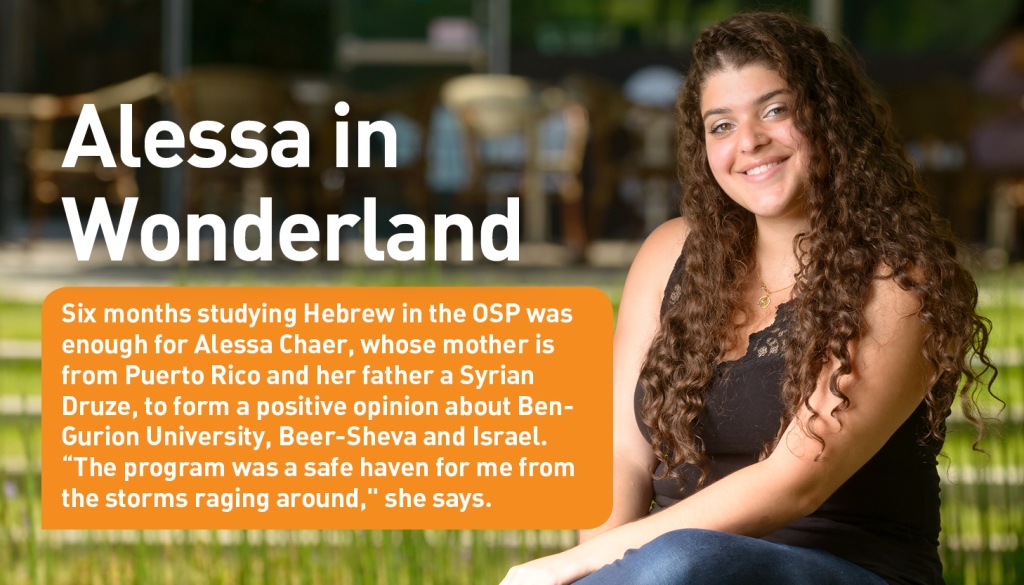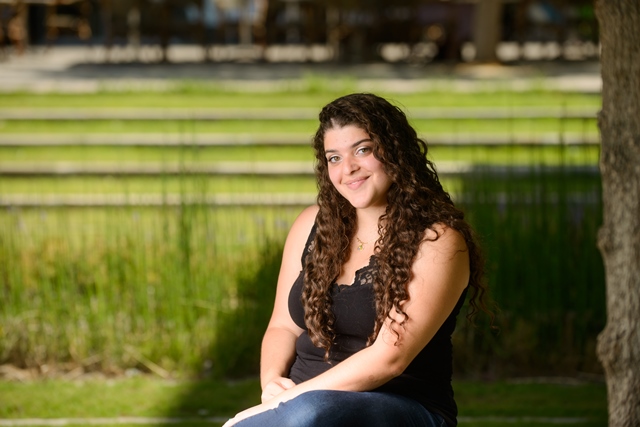Six months studying Hebrew in the Ginsburg-Ingerman Overseas Student Program (OSP)was enough for Alessa Chaer, whose mother is from Puerto Rico and her father a Syrian Druze, to form a positive opinion about Ben-Gurion University, Beer-Sheva and Israel. “The program was a safe haven for me from the storms raging around," she says.

Alessa Chaer lives in the Bronx in New York. She grew up in a bi-national and bi-faith home: her mother is Catholic from Puerto Rico and her father a Druze from Syria. One of her parents was conservative, the other liberal. After her parents divorced, she found it difficult to form a clear identity. But there was one thing she had no doubts about – BGU's quality and the uniqueness of the program for foreign students convinced her to come study in Israel – at the country's most popular university.
She is currently a student at The City College of New York, on the way to Harlem, studying Judaism and psychology. Hebrew language studies are a priority for her.
Chaer was always interested in languages. "My main language is English, while Spanish and Arabic were both spoken at home. As for the Hebrew language, I thought it would offer me a balance: Hebrew is a Semitic language like Arabic, but there are many words and phrases just like in modern English," she says in an interview for the University's Alef, Bet, Gimmel magazine.
The fact that she understands three of the main languages spoken in Israel, Hebrew, Arabic and English, allowed her to formulate a special point of view. "Knowing only English limits its speakers to a Western mind-set," she believes. "If I spoke only English, people would see me as a tourist. My proficiency in Arabic opened a lot of doors for me, and in this way I made a lot of friends, who showed me things that do not get shown to those who know only Hebrew and English. They trusted me. In the meantime, my Hebrew got better, which was the main goal of my coming to Israel."
How did your family react when you wanted to fly to Israel?
"My mother supported the idea and helped me realize it, because she knew how much it means to me. My grandmother was afraid, but I reassured her. I explained to my family that this is my life, and I'm not ready to give up my dreams. They understood that my desire to study in Israel comes from the depths of my soul."
Did the volatile security situation in the Middle East not frighten you?
"Bad things happen in every country, I wasn't at all worried."
Why did you choose Ben-Gurion University?
"When I asked City College for help travelling to Israel to learn Hebrew, I was told that a student from Ben-Gurion University had once studied there. So they pointed me in the direction of “your" University and I'm glad."
What made you happy on campus?
"The campus is beautiful and welcoming with a friendly atmosphere. There are a lot of events; you only have to be open to many possibilities. I promise to recommend to my friends in New York that they come here."
How did you integrate into the OSP?
"My family-cultural-religious background had a big impact on my experiences in Israel. The OSP provided me with a supportive framework, a framework in which I felt I could be myself and live the way I want. The teaching staff helped in every area. During moments of failure and crisis, they knew how to help and encourage. Many of us – like me – were here for the first time on their own, alone, and it's not easy. So the administration and lecturers in the program didn't only teach and didn't only use computers well, they also used their hearts. They turned us into a group of friends, people who care about each other. The program was a safe haven for me from the storms raging around."

The transition from New York to Beer-Sheva was not too difficult?
"This city is growing and developing rapidly, and Ben-Gurion University is the city's gem. New York – the giant metropolis I came from is noisy and turbulent and everything in it runs at full speed, so I really enjoyed the relative quiet in Beer-Sheva. It's a great place for students. Here you can study quietly for hours on end and then go out dancing at a party. Apart from water, there is everything here."
Can you share with us your experiences as a student?
"I lived in the student dormitories and met lots of students. Some of them are now my friends. I met Druze students in the dorms and travelled with them to Druze villages in the Galilee."
What is your impression of Israel?
"Everything was interesting here. In America I was searching for myself, my identity, who I am, what I am, and in Israel found the answers. I came here without family, I did not know anybody here, and I am not Jewish – all these were difficulties, but better termed as challenges. The beginning was difficult, but as the days passed, I felt more confident and learned to 'navigate' my way here. I travelled to Druze villages in the Galilee and in the Golan Heights, and I felt at home. I went to the West Bank and felt a closeness to the residents there."
Could you elaborate?
“My encounters with the residents of the West Bank were very interesting. I learned how they see the political and economic situation. I was surprised by the level of their Hebrew."
Are you able to compare Israel and Syria?
"Yes. I have a unique perspective on matters in Israel: I visited Syria six years ago and met Druze there; I also met the Druze in Israel, and compared them in terms of emotions and thoughts. Some of the Druze I met here have relatives in Syria and would like to travel to Syria to meet them, if one day it becomes possible. As for me – I belong on both sides of the barrier."
Has your opinion of Israel changed during the six months you lived here?
"The development of this country in less than 70 years, in all areas, is amazing. The people are warm and open. When you look at Israel from afar, through television, it is very easy to criticize, but when you live here you understand and learn to appreciate many things. I was lucky enough to see both sides of the political divide first hand; to see and hear, and I hope I get it. The reality here is not at all simple, not black or white. There are tensions between Arabs and Jews, Ashkenazim and Sephardim, religious and secular, veteran Israelis and new immigrants (such as Ethiopians), and there are military threats and terrorist attacks – and Israel manages despite all these contradictions. Well done! In the six months I was here I got a complete picture of the situation and I feel like I get it and can take the bad with the good."
What will you miss the most?
"'Rav-Kav' [the bus pass]. I'm in love with it. It's like a credit card combined with an identity card."
What do you take with you from here?
"Everything. Living on my own without my family. I always knew that one day it would happen, but I never imagined it would be abroad and not in America, and specifically in Israel. At first I suffered quite a bit here, but I've matured personally. I learned to appreciate people as they are. I learned that people are a precious thing, much like life itself. I'll go back to the US stronger, wiser, and more empathetic."
How would you summarise your Israeli experience?
"Six months is not enough to digest and absorb so many experiences. Just when I finally speak and understand Hebrew quite well, I have to go back to America. At City College I'll continue to study Hebrew at a higher level, and maybe one day I'll be able to teach Hebrew.
Thank you, thank you, thank you for everything. Thank you Israel, thank you Beer-Sheva, thank you Ben-Gurion University and the Overseas Student Program. I'm leaving all of you and I already want to come back…."
This article was first published in the September 2016 edition
of the official Hebrew-language University newsletter Alef, Bet, Gimmel